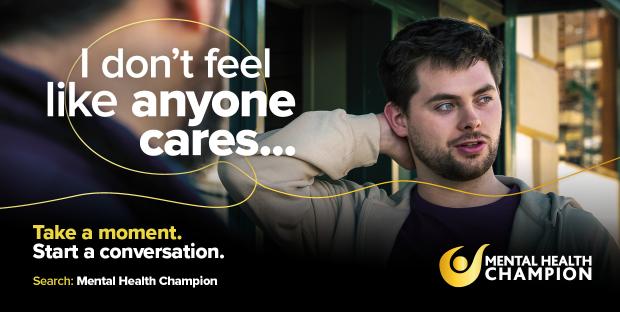The Mental Health Champion’s current campaign ‘Take a Moment. Start a Conversation.’ is back this year for World Suicide Prevention Day. It aims to inspire people to connect with others, in the knowledge that small everyday conversations can have a powerful impact.
The campaign recognises that human connections can help people in crisis, and interrupt overwhelming and negative thoughts.

Discussing the campaign Professor O’Neill said:
“It’s important to know that we don’t need special training to make a difference to a person who is in crisis. Reaching out to someone in distress can be as simple as asking how their day is going, or it could include a direct conversation about suicidal thoughts. It’s important to know that you’re not likely to make a situation worse by asking someone if they are suicidal. By initiating these vital conversations, we can break down barriers, show we care, and create cultures of understanding and support.”
While raising awareness of crisis intervention and suicide prevention is necessary, Professor O’Neill highlights that systemic change is needed:
“I continue to be disappointed and frustrated with the slow pace of change in the transformation of mental health services. Since its launch in 2021, the Mental Health Strategy has received only a small fraction of the necessary funding. The Strategy has mainly resulted in a series of reviews, plans and some structural changes. There is no progress towards the 45% uplift in staff for statutory mental health services, and minimal changes in the availability of services”.
“There have been some improvements in individual services and these are commendable; however, funding to services delivered by the community and voluntary sector has been decimated. The per-capita spend on mental health services in NI remains the lowest of the UK regions, despite the evidence of higher levels of need here and the extent of complex, trauma-related mental health difficulties.”
“I’m frustrated by the slow progress of change on the ground. Many continue to suffer, and 45% of people do not receive a beneficial service within the recommended 9 weeks. The Programme for Government only refers to continued implementation of the Strategy, which does not inspire hope that the budget will be increased to match what is needed, as set out in the Funding Plan.”
Professor O’Neill also spoke about her concern regarding suicide deaths in NI:
“I am very concerned about our high suicide rates, and am calling for the Regional Mental Health Crisis Service, which was announced in 2021, to be rolled out as a matter of urgency. This would connect existing services, and provide regionally consistent, community-based services, with follow-up counselling, for people in distress who do not need psychiatric care.”
The Mental Health Champion also paid tribute to the staff in Mental Health and Suicide Prevention services:
“I thank those who work in services, I know that they make a real, life changing, difference to people in despair. They are working under immense pressure in an under resourced system, and they themselves experience low morale and moral injury.”
“There are over 200 registered suicide deaths annually. Each loss brings bring deep and lasting suffering to families, friends, and communities. Many more struggle with suicidal despair who have difficulty getting support and services. The time for planning is over, the Executive need to act now and deliver on these plans.”
If you or someone you know is in crisis, please call Lifeline on 0808 808 8000. They are free to call and are available 24 hours a day, 7 days a week.
NOTES TO EDITOR
Find out more about the Mental Health Champion’s campaign, ‘Take a Moment. Start a Conversation.’ here.
Mental Health spend in NI is just £200 per person, compared to £324 in Wales, £270 in Scotland, and £244 in England. Currently only 7% of the total health budget in Northern Ireland is allocated to mental health, in contrast to 11.4% in England: https://www.niassembly.gov.uk/globalassets/documents/committees/2022-2027/pac/reports/2023-2024/mental-health-services/pac-report-on-mental-health-services-in-northern-ireland.pdf
Fact Check NI - Mental Health in NI: Does Northern Ireland have the highest rate of people claiming disability benefits and the highest prevalence of mental ill health in the UK?: https://factcheckni.org/wp-content/uploads/2025/04/Mental-Health-Overview-Stats.pdf
Announcement of the new Regional Mental Health Crisis Service: https://www.health-ni.gov.uk/news/new-regional-mental-health-crisis-service